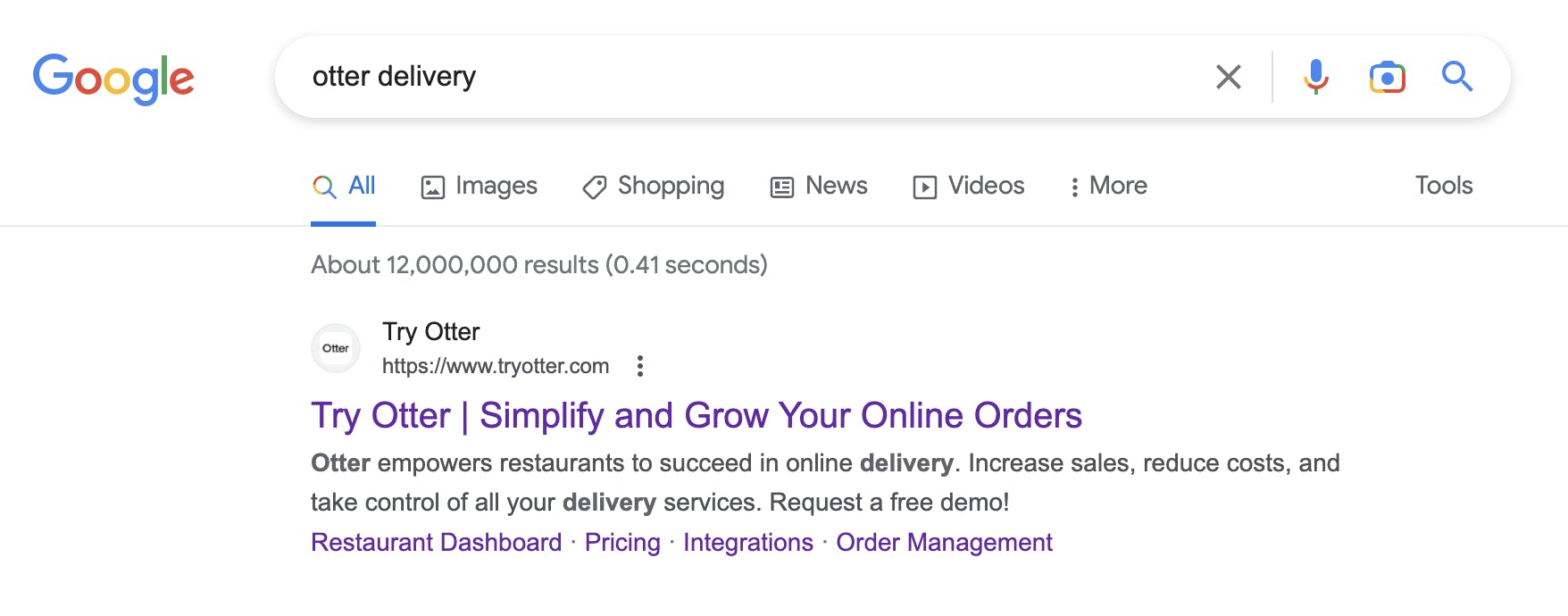
If you’re a restaurateur with a website, you may have heard the term “SEO” used online. Many sources discuss how useful SEO is for a restaurant’s profitability, but it often seems technical and difficult to understand. That’s where Otter can help! With this guide to Search Engine Optimization, you’ll discover a powerful, cost-effective way to promote your restaurant online.
SEO is key for building awareness of your brand, and it can help you gain a greater understanding of your target audience. With the right strategy, it also serves as a major driver of online profit! Let’s take a deep dive into the world of restaurant SEO, and see why it’s so important to your restaurant’s digital success.


What is Restaurant SEO, anyways?
Search Engine Optimization is the way that search engines decide where to put your website on their results pages. Websites with high SEO are placed closer to the top of the results page, encouraging users to engage with them. If your website has poor SEO, it will be placed at the bottom of the results page – or on another page entirely. This harms your website’s visibility, and prevents users from visiting and interacting with your business online. As a restaurant, this also hurts your profitability – if customers don’t know about your business, they can’t order from you.

How do I start using SEO?
Like any marketing strategy, getting the most out of SEO requires a strong understanding of your customers’ tastes and preferences. Before you start editing your website, research what your target audience wants to know more about. Consider what a person might type into a search engine to find your website. What kind of cuisine do you serve? Where is your restaurant located? How could a customer find your business online?
Once you know what search queries (or keywords) your eaters are using, start updating your restaurant’s website with them! Incorporate these keywords into your website’s text, visual assets, and page data in an organic way. As you do, search engines will recognize your business’s subject matter, and begin to optimize your website’s search engine performance. (Be sure not to overload your website with keywords – search engines will know when you’re being insincere. Use a tool like Yoast to employ keywords intelligently, and focus on your community’s highest-ranking niches!)
When your updates are complete, congratulations – you’ve upgraded your restaurant SEO! Update your keywords on a regular basis, and you’ll start to see your restaurant’s website rise up the results page. Customers will now be able to quickly find your restaurant by searching for it online!

What are some general SEO tips?
We’re glad you asked! Several free resources exist to make SEO easier. You can learn about what your target audience is interested in through a tool like Otter’s Local Restaurant Trends. SEO websites like SEMRush and AHRefs both offer a variety of services to help you discover your customers’ search habits. Many organic marketing platforms like HubSpot also offer instructions and tutorials on determining the best SEO strategies for your business’s needs. Leverage these resources to build a strong foundation for your SEO efforts.
Something else you’ll want to keep in mind is the jargon surrounding SEO. As a digital concept, it’s surrounded by a few abbreviations and terms that are commonly used to describe its functions. Feel free to save this glossary as a record of them all:
- SEO: Short for Search Engine Optimization. This is how search engines (like Google and Bing) determine a website’s placement on a results page.
- Keyword: A word or phrase that a customer would search for to find a website. (For example: Googling “Boston diners” shows a collection of websites for diners in Boston.)
- SEM: Short for Search Engine Marketing. This is the act of using SEO to promote a business through a search engine.
- SERP: Short for Search Engine Results Page. When you search for something on a search engine, it will bring you to one of these: a list of websites related to your search.
- SER: Short for Search Engine Ranking. The order, from top to bottom, of websites displayed on an SERP. Websites with the highest SEO have an SER of 1, and so on.

Don’t forget: You can enhance your restaurant’s SEO even more outside of your website! By hosting your own ordering service or promoting your restaurant on a major delivery platform, your business can appear several times on a SERP. Determine which SEO strategy works best for your restaurant, and ensure your business is always easy to search for.

Am I ready to get started with Restaurant SEO?
Yes! You now have all the knowledge and resources to optimize your website’s search engine performance. Use these tools to expand your customer base, increase order revenue, and make your website instantly accessible! Restaurant SEO may seem heavy at first, but your business will gain a significant competitive advantage by mastering it. Strong SEO strategies keep restaurants at the top of customers’ minds – and results pages.







